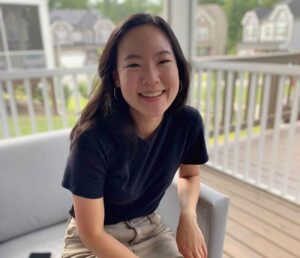Seh-Joo Kwon is a Ph.D. candidate within the Department of Psychology and Neuroscience at the University of North Carolina at Chapel Hill’s College of Arts and Sciences. She is the recipient of the Carol and Ed Smithwick Summer Research Fellowship. With this funding, Kwon will continue to work on her dissertation, focusing on risk-taking behaviors in adolescents.
Support graduate students like Seh-JooQ: Tell me a bit about yourself.

Originally, I’m from Korea. My dad was in the embassy, and so I moved around a lot growing up. I went to college at Carnegie Mellon University, where I studied biology and psychology. The year after I graduated, I did geriatric research at the University of Pittsburgh Medical Center.
Q: Tell me about your research.
I loved my teenage years growing up. I went to a small high school, so all of us were close. It wasn’t like any of those stereotypical high school experiences, so I found it to be really fun, which is why I ended up studying adolescents. Broadly, my research looks at social influences on adolescent decision making. I use functional magnetic resonance imaging (fMRI) to look at brain activation during the decision-making process. There’s already a lot of research looking at how social influences impact adolescents’ own risk-taking, but there’s little that looks at how they take risks for other people.
Q: What will this summer funding allow you to do?
Most summers I’m paid as a research assistant, so I’m focused on helping my advisor with her research grant. This support allows me to focus on my dissertation without additional responsibilities. This summer I’ve been focusing a lot on cleaning data, which takes a lot of time. It’s an opportunity I’m very grateful for.
Q: What does it mean to have generous donors support your research?
It’s very validating to have someone affirm that your research is important. Especially in grad school where imposter syndrome is so big and you don’t know if your research is interesting to people outside of psychology. Even within the department, I don’t know what everyone is working on, so I don’t know how much other people care about my own research. I think it’s just validating that people find it interesting.
Q: What brought you to Carolina for graduate school?
When it came to graduate school, I cast my net wide. Ultimately, I came here because of my advisor, Eva Telzer, because I thought she was a perfect research fit. Then when I interviewed here, I loved all the lab members as well.
—Kate Slate
